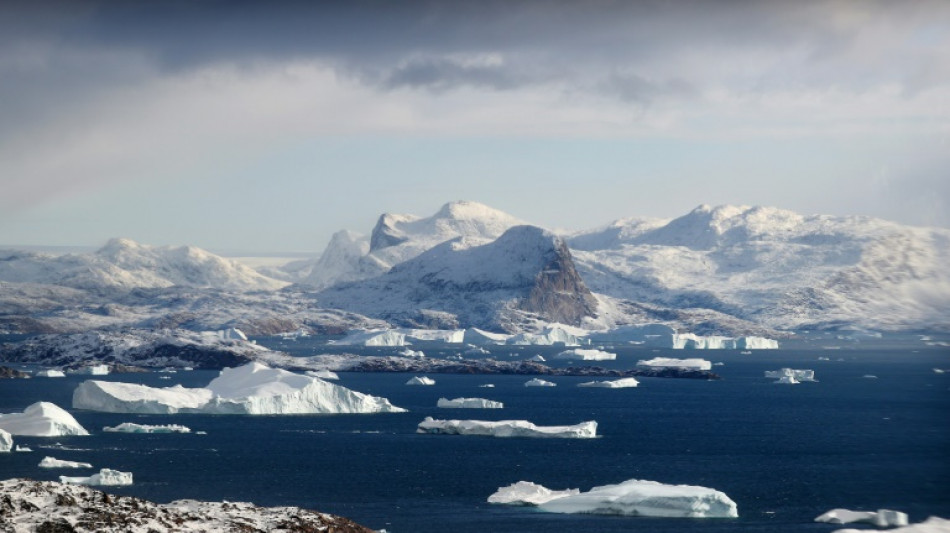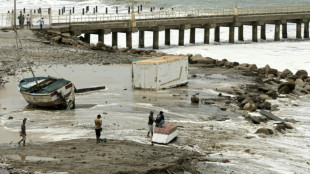
-
 Taliban leader bans windows overlooking women's areas
Taliban leader bans windows overlooking women's areas
-
179 dead in South Korea's worst plane crash

-
 At least 177 dead in South Korea's worst plane crash
At least 177 dead in South Korea's worst plane crash
-
Three die in clandestine Channel crossing attempt

-
 All but two feared dead after South Korea plane crashes with 181 aboard
All but two feared dead after South Korea plane crashes with 181 aboard
-
Japan's Wajima craftmakers see hope in disaster-hit region

-
 One dead in Ecuador, Peru ports closed amid massive waves
One dead in Ecuador, Peru ports closed amid massive waves
-
Suriname rules out state funeral for ex-dictator Bouterse

-
 Turkey's pro-Kurd party meets jailed PKK leader
Turkey's pro-Kurd party meets jailed PKK leader
-
EU universal charger rules come into force

-
 Trump asks US Supreme Court to pause law threatening TikTok ban
Trump asks US Supreme Court to pause law threatening TikTok ban
-
Tech slump slays Santa rally, weak yen lifts Japan stocks higher

-
 Montenegro to extradite crypto entrepreneur Do Kwon to US
Montenegro to extradite crypto entrepreneur Do Kwon to US
-
Brazil views labor violations at BYD site as human 'trafficking'

-
 Weak yen lifts Japan stocks higher, Wall Street slides
Weak yen lifts Japan stocks higher, Wall Street slides
-
Tourists return to post-Olympic Paris for holiday magic

-
 Global stocks rise as Japan led Asia gains on a weaker yen
Global stocks rise as Japan led Asia gains on a weaker yen
-
Asian markets mostly rise but political turmoil holds Seoul back

-
 Move over Mercedes: Chinese cars grab Mexican market share
Move over Mercedes: Chinese cars grab Mexican market share
-
Japanese shares gain on weaker yen after Christmas break

-
 Fleeing Myanmar, Rohingya refugees recall horror of war
Fleeing Myanmar, Rohingya refugees recall horror of war
-
Peru ex-official denies running Congress prostitution ring

-
 The Bilingual Book Company Launches New, Innovative Bilingual Audiobook App
The Bilingual Book Company Launches New, Innovative Bilingual Audiobook App
-
US stocks take a breather, Asian bourses rise in post-Christmas trade

-
 Three dead, four injured in Norway bus accident
Three dead, four injured in Norway bus accident
-
Turkey lowers interest rate to 47.5 percent

-
 Sri Lanka train memorial honours tsunami tragedy
Sri Lanka train memorial honours tsunami tragedy
-
Asia stocks up as 'Santa Rally' persists

-
 2004 Indian Ocean tsunami: what to know 20 years on
2004 Indian Ocean tsunami: what to know 20 years on
-
Russian state owner says cargo ship blast was 'terrorist attack'

-
 Sweeping Vietnam internet law comes into force
Sweeping Vietnam internet law comes into force
-
Thousands attend Christmas charity dinner in Buenos Aires

-
 Demand for Japanese content booms post 'Shogun'
Demand for Japanese content booms post 'Shogun'
-
Mystery drones won't interfere with Santa's work: US tracker

-
 Global stocks mostly higher in thin pre-Christmas trade
Global stocks mostly higher in thin pre-Christmas trade
-
NASA probe makes closest ever pass by the Sun

-
 Global stocks mostly rise in thin pre-Christmas trade
Global stocks mostly rise in thin pre-Christmas trade
-
Global stocks mostly rise after US tech rally

-
 Investors swoop in to save German flying taxi startup
Investors swoop in to save German flying taxi startup
-
Saving the mysterious African manatee at Cameroon hotspot

-
 The tsunami detection buoys safeguarding lives in Thailand
The tsunami detection buoys safeguarding lives in Thailand
-
Asian stocks mostly up after US tech rally

-
 US panel could not reach consensus on US-Japan steel deal: Nippon
US panel could not reach consensus on US-Japan steel deal: Nippon
-
The real-life violence that inspired South Korea's 'Squid Game'

-
 El Salvador Congress votes to end ban on metal mining
El Salvador Congress votes to end ban on metal mining
-
Five things to know about Panama Canal, in Trump's sights

-
 Mixed day for global stocks as market hopes for 'Santa Claus rally'
Mixed day for global stocks as market hopes for 'Santa Claus rally'
-
Trump's TikTok love raises stakes in battle over app's fate

-
 European, US markets wobble awaiting Santa rally
European, US markets wobble awaiting Santa rally
-
NASA solar probe to make its closest ever pass of Sun

| RBGPF | 100% | 59.84 | $ | |
| CMSD | -0.67% | 23.32 | $ | |
| GSK | -0.12% | 34.08 | $ | |
| SCS | 0.58% | 11.97 | $ | |
| RIO | -0.41% | 59.01 | $ | |
| VOD | 0.12% | 8.43 | $ | |
| RELX | -0.61% | 45.58 | $ | |
| NGG | 0.66% | 59.31 | $ | |
| RYCEF | 0.14% | 7.27 | $ | |
| BCC | -1.91% | 120.63 | $ | |
| AZN | -0.39% | 66.26 | $ | |
| BCE | -0.93% | 22.66 | $ | |
| CMSC | -0.85% | 23.46 | $ | |
| BTI | -0.33% | 36.31 | $ | |
| BP | 0.38% | 28.96 | $ | |
| JRI | -0.41% | 12.15 | $ |

Greenland ice cap loses enough water in 20 years to cover US: study
Greenland's immense ice sheet has lost enough ice in the past 20 years to submerge the entire United States in half a metre of water, according to data released this week by Danish researchers.
The climate is warming faster in the Arctic than anywhere else on the planet and melting ice from Greenland is now the main factor in the rise in the Earth's oceans, according to NASA.
Since measurements began in 2002, the Greenland ice sheet has lost about 4,700 billion tonnes of ice, said Polar Portal, a joint project involving several Danish Arctic research institutes.
This represents 4,700 cubic kilometres of melted water -- "enough to cover the entire US by half a meter" -- and has contributed 1.2 centimetres to sea level rise, the Arctic monitoring website added.
Polar Portal's findings are based on satellite imagery from the US-German GRACE programme (Gravity Recovery and Climate Experiment), which showed the ice melt to be most severe near the coasts of the Arctic territory, at the edge of the ice sheet.
In these peripheral zones, "independent observations also indicate that the ice is thinning, that the glacier fronts are retreating in fjords and on land, and that there is a greater degree of melting from the surface of the ice", the website said.
The west coast of Greenland is particularly affected, according to the data.
Climate change is particularly alarming in the Arctic, which scientists say is warming at a rate three to four times the global average.
According to a study published by NASA in late January, the accelerated melting near Greenland's coasts can be explained by the warming of the Arctic Ocean.
The phenomenon "is melting Greenland's glaciers at least as much as warm air is melting them from above".
Melting ice from Greenland is currently the main factor in the rise in the Earth's oceans and the territory's glaciers are now retreating six to seven times faster than they were 25 years ago, the US agency added.
According to climate scientists, the Greenland ice sheet contains enough water to raise the oceans by more than seven metres, and the ice sheet in Antarctica contains enough for a rise of almost 50 metres.
Arctic sea ice cover, although its melting has no effect on sea levels, has also shrunk considerably, losing almost 13 percent of its average surface area every 10 years.
P.Gonzales--CPN
